Rappaport Vassiliadis Salmonella Enrichment Broth
Pack Size: 500gm
Brand: Micro Master
Origin: India
Intended Use
Rappaport Vassiliadis Salmonella Enrichment Broth (DM1405H) is recommended for selective enrichment of Salmonella species from pharmaceutical products using the microbial limit testing in compliance with the harmonized methodology of USP/EP/BP/JP.
Product Summary and Explanation
An enrichment medium for Salmonella that included very high amounts of malachite green and magnesium chloride as inhibitors was formulated by Rappaport et al.(1) The original Rappaport medium was developed for the enrichment of S. paratyphi and other serotypes that were known to be relatively resistant to brilliant green. In addition, magnesium chloride was found to counteract the toxic effect of the dye for Salmonella.(2) Vassiliadis et al. modified the formulation by reducing the concentration of the malachite green to one third.(3) Further, Van Schothorst and Renaud reported that using soy peptone instead of animal peptone improved recovery rates of Salmonella.(4) Present medium is a modification of the Rappaport Vassiliadis Enrichment Broth described by Van Schothorst and Renauld.(4) It is prepared in accordance with the harmonized methodology of USP/EP/BP/JP(5,6,7,8) has been found to be superior to other
Salmonella selective medias. By using this medium Salmonella species can be isolated from human faeces without pre-enrichment. Vassiliadis et al. recommended incubation of RV media at 43°C for maximum selectivity. Any deviation above 43°C may be lethal for Salmonella. Later, work by Peterz showed that incubation at 41.5 ± 0.5°C for 24 hours improved recovery of Salmonella spp.(9) As compared to other bacteria, Salmonella generally survive at little high osmotic pressure, grow at slightly low pH and are resistant to malachite green. These characteristics of Salmonella are exploited in this medium for selective enrichment.
Principles of the Procedure
Rappaport Vassiliadis Soya Broth (RVS Broth) contains soya peptone that contains natural sugars which provide essential growth nutrients and enhance the growth of Salmonella.(10) Magnesium chloride raises the osmotic pressure in the medium. Phosphates act as buffering agents in the medium to maintain the constant pH. Sodium chloride maintains the osmotic balance. Malachite green is inhibitory to organisms other than Salmonellae. The low pH of the medium, combined with the presence of malachite green and magnesium chloride, helps to select for the highly resistant Salmonella species. The relatively lower concentration of nutrition, also aids selective enrichment of Salmonella.
Formula / Liter
| Ingredients | : Gms / Liter |
| Soya peptone | : 4.50 |
| Sodium chloride | : 8.00 |
| Potassium dihydrogen phosphate | : 0.60 |
| Dipotassium phosphate.3H2O | : 0.40 |
| Magnesium chloride. Hexahydrate | : 29.00 |
| Malachite green | : 0.036 |
| Final pH: 5.2 ± 0.2 at 25°C | |
| Formula may be adjusted and/or supplemented as required to meet performance specifications | |
Precautions
1. For Laboratory Use only.
2. IRRITANT. Irritating to eyes, respiratory system, and skin.
Directions
1. Suspend 27.11 grams of the medium (the equivalent weight of dehydrated medium per litre) in one liter of purified/distilled water.
2. Heat if necessary to dissolve the medium completely.
3. Mix well and dispense as desired into test tubes.
4. Autoclave at 115°C / validated cycle.
Quality Control Specifications
| Dehydrated Appearance | : Light yellow to light blue homogeneous free flowing powder |
| Prepared Medium | : Greenish blue clear to slightly opalescent with a slight precipitate |
| Reaction of % Solution | : Not Applicable |
| Gel Strength | : Not Applicable |
Cultural Response
Growth Promotion is carried out in accordance with harmonized method of USP/BP/EP/JP. Cultural response was observed after an incubation at 30-35°C for specified time. Recovery is carried out using Xylose Lysine Deoxycholate Agar (MH031), after enrichment in Rappaport Vassiliadis Salmonella Enrichment Broth.
Growth promoting properties
Clearly visible growth of microorganism comparable to that previously obtained with previously tested and approved lot of medium occurs at the specified temperature for not more than the shortest period of time specified inoculating <=100 cfu (at 30-35°C for <=18 hours).
Inhibitory properties
No growth of the test microorganism occurs for the specified temperature for not less than longest period of time specified inoculating >=100 cfu (at least 100 cfu) (at 30-35°C for >= 24 hours).
Expected Cultural Response:
| Sr. No. |
Organisms | Results to be achieved | |||||
| Inoculum (CFU) |
Growth | Observed lot value (CFU) |
Recovery | Colour of Colony |
Incubation period |
||
| Growth promoting | |||||||
| 1. | Salmonella Typhimurium ATCC 14028 |
50-100 | good- luxuriant |
>=35 | >=70% | red with black centers |
<=18 hrs |
| 2. | Salmonella Abony NCTC 6017 |
50-100 | good- luxuriant |
>=35 | >=70% | red with black centers |
<=18 hrs |
| Inhibitory | |||||||
| 3. | Staphylococcus aureus ATCC 6538 |
>=10³ | inhibited | 0 | 0% | —- | >=24 hrs |
| Additional Microbiological testing | |||||||
| 4. | Escherichia coli ATCC 25922 |
50-100 | none-poor | 0-10 | 0-10% | yellow | 18-24 hrs |
| 5. | Escherichia coli ATCC 8739 |
50-100 | none-poor | 0-10 | 0-10% | yellow | 18 -24 hrs |
| 6. | Salmonella Enteritidis ATCC 13076 |
50-100 | good- luxuriant |
>=35 | >=70% | red wit black centers |
18-24 hrs |
| 7. | Salmonella Paratyphi B ATCC 8759 |
50-100 | good- luxuriant |
>=35 | >=70% | red with black centers |
18-24 hrs |
| 8. | Staphylococcus aureus ATCC 25923 |
>=10³ | inhibited | 0 | 0% | —- | >=24 hrs |
| 9. | Pseudomonas aeruginosa ATCC 9027 |
>=10³ | inhibited | 0 | 0% | —- | >=24 hrs |
| 10. | Pseudomonas aeruginosa ATCC 27853 |
>=10³ | inhibited | 0 | 0% | —- | >=24 hrs |
| 11. | Enterococcus faecalis ATCC 29212 |
>=10³ | inhibited | 0 | 0% | —- | >=24 hrs |
| E.coli +S.Typhimurium (mixed culture) | |||||||
| 12. | Salmonella Typhimurium ATCC 14028 |
50-100 | good- luxuriant |
>=35 | >=70% | red with black centers |
<=18 hrs |
The organisms listed are the minimum that should be used for quality control testing.
Test Procedure
Refer to appropriate references for details on test methods.
Results
Examine selective plates for typical Salmonella colonies. Confirm identification of isolates by biochemical and/or serological tests as directed in appropriate references.
Storage
Store the sealed bottle containing the dehydrated medium at 2 – 30°C. Once opened and recapped, place container in a low humidity environment at the same storage temperature. Protect from moisture and light.
Expiration
Refer to the expiration date stamped on the container. The dehydrated medium should be discarded if not free flowing, or if the appearance has changed from the original color. Expiry applies to medium in its intact container when stored as directed.
Limitations of the Procedure
1. The combined inhibitory factors of this medium (malachite green, magnesium chloride, low pH) may inhibit certain Salmonella, such as S. typhi and S.paratyphi A.
2. This medium was reported to be superior to Salmonella selective medium like Tetrathionate Broth and Selenite enrichment broth and to Tetrathionate-Brilliant Green Broth for the detection of Salmonellae in milk samples.
3. The enriched culture of Rappaport Vasiliadis Soya Broth (DM1405) can be further subcultured and isolated on Brilliant Green Agar (DM044) or Deoxycholate Citrate Agar (DM577), Xylose Lysine Deoxycholate Agar (DM297).
4. Consult appropriate texts for detailed information and recommended procedures.

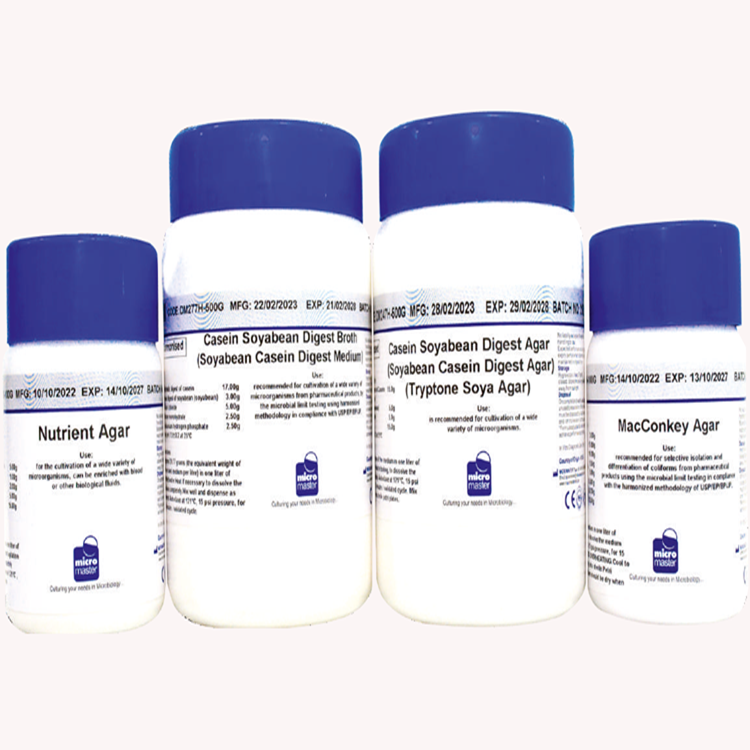
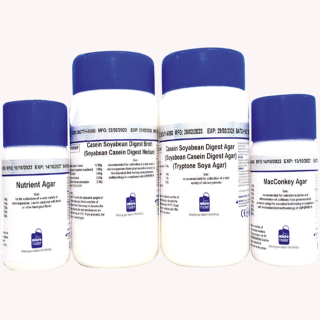

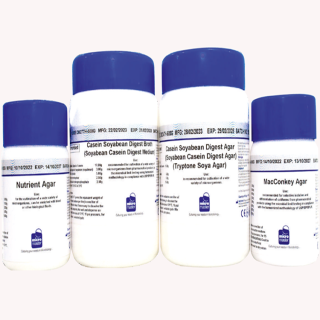

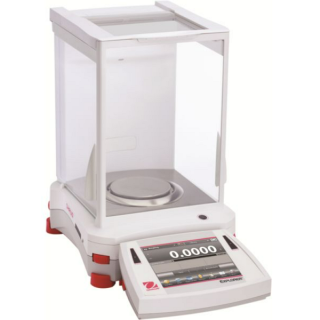
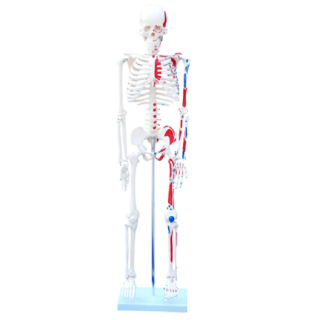
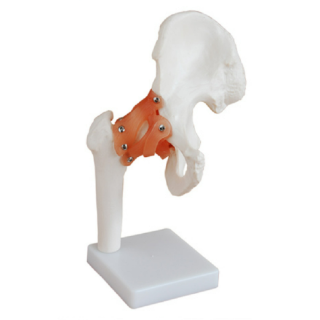
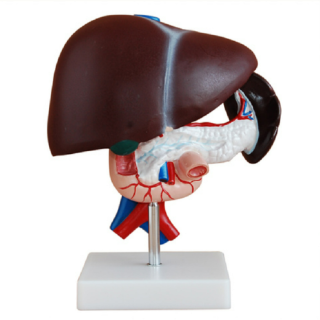
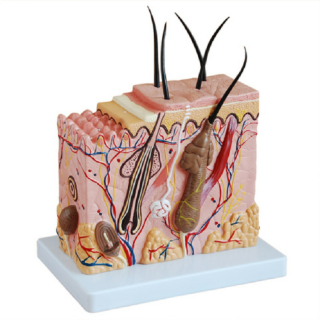

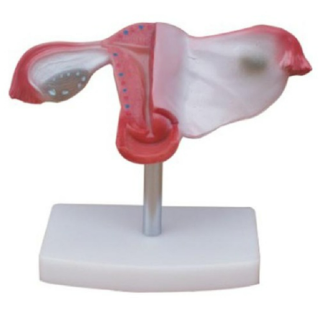
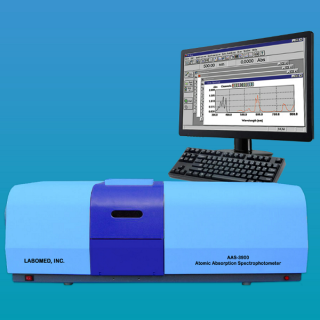
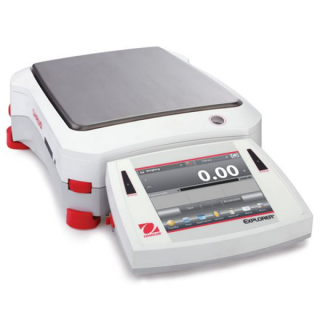

Reviews
There are no reviews yet.